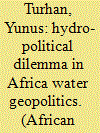|
|
|
Sort Order |
|
|
|
Items / Page
|
|
|
|
|
|
|
| Srl | Item |
| 1 |
ID:
132838


|
|
|
|
|
| Publication |
2014.
|
| Summary/Abstract |
Egypt, Ethiopia, and Sudan are set to resume tripartite talks over the disputed grand Ethiopian renaissance dam. Anna Boyd examines the project's potential impact on Egypt, the country's response options are whether a deal is likely to be brokered.
|
|
|
|
|
|
|
|
|
|
|
|
|
|
|
|
| 2 |
ID:
150542


|
|
|
|
|
| Summary/Abstract |
Home to more than 160 million people, the Nile River Basin has become one of the hotspots of the global quest for food, water and energy security. Moving closer to its completion, the Grand Ethiopian Renaissance Dam (GERD) highlights the interplay between the food, water, and energy sectors and their implications on geopolitical power relations in the region. Despite Ethiopia having the highest volumetric contribution to the Nile river flow, Egypt has maintained hydro-hegemony over the basin for several decades on the basis of historical claims and colonial agreements. Egypt has stated that its volumetric share of the Nile’s water is not sufficient to sustain its growing population, declaring water availability a matter of national security. However, for Ethiopia, the GERD represents a crucial moment in its development agenda, acting as both a counterhegemonic power play, as well as a means to improving the hydropower capacity of the country, and ensuring future food security. This paper explores the various hegemonic and counter-hegemonic strategies employed by Egypt and Ethiopia respectively, highlighting the various ways in which food, water, and energy concerns are intrinsic components of the asymmetric power configurations of the Nile River Basin. By navigating the debate surrounding the GERD, this paper highlights the necessity of incorporating the food, water, and energy nexus into studies of hydro-hegemony and counter-hegemony. This allows the future policy direction for nexus management and governance in the Nile River Basin to move beyond benefit sharing, instead steering towards power sharing.
|
|
|
|
|
|
|
|
|
|
|
|
|
|
|
|
| 3 |
ID:
180220


|
|
|
|
|
| Summary/Abstract |
When foreign policies of states are examined, pride of place often goes to what are called high politics: the politics of diplomacy and war. However, for most developing nations, especially those in the region of sub-Saharan Africa, economic foreign policy, or low politics, may be as, or even more, important. In fact, the foreign policies of African nations are often seen as an extension of strategies to consolidate domestic political power. African leaders routinely place themselves in charge of foreign policy as a means of controlling these resource flows as well as to create some autonomy from competing domestic political forces. This is not to say that external state forces do not impinge on the ability of leaders to stay in power; however, in sub-Saharan Africa, this has been less of a priority, perhaps with the significant exception of Ethiopia. This paper seeks to show that the general foreign policy perspectives of Ethiopia from 1991 to the present have been an extension of the leaders and ruling elites trying to obtain significant sources of financial resources by exploring the general trends of how Ethiopia has engaged in international flows of resources. Examining Ethiopian foreign policy on three levels—international, regional, and domestic—this paper explains how, despite being a potential regional hegemon, Ethiopia has significant problems stemming from domestic issues of poverty and legitimacy. Moreover, the Grand Ethiopian Renaissance Dam will be highlighted as a case to explore how it affects, and is impacted by, all three levels.
|
|
|
|
|
|
|
|
|
|
|
|
|
|
|
|
| 4 |
ID:
177867


|
|
|
|
|
| Summary/Abstract |
Water-related conflict chronology can be grouped around two broad sets of ideas: On the one hand is material-related conflict such as water stress and under-development; while on the other is management-related conflict including state-failure and lack of governance. In line with the latter form of conflict, this paper gives a specific consideration to the three types of causal factors looming with the potential for conflict over the Nile basin: Political tensions among stakeholders, lack of all-inclusive agreement on management of the Nile water, and states' unilateral actions. By identifying these causal factors, this study limits itself to focus on the initial phase of conflict resolutions, that is diagnosing sources to select some aspects of perceived reality and make them more salient in the methodological context. Based on Johan Galtung's theoretical approaches on conflict dynamics, the paper explores two areas that are lacking in current literature. It accounts for the sources of conflict over the Nile basin hinging on three variables, while mapping the nature of the on-going negotiation process around Ethiopia's “Grand Ethiopian Renaissance Dam” construction. This process is distributive in form and offers a collaborative (win-win) form of negotiations to cement the latter and to redress current predicaments.
|
|
|
|
|
|
|
|
|
|
|
|
|
|
|
|
|
|
|
|
|